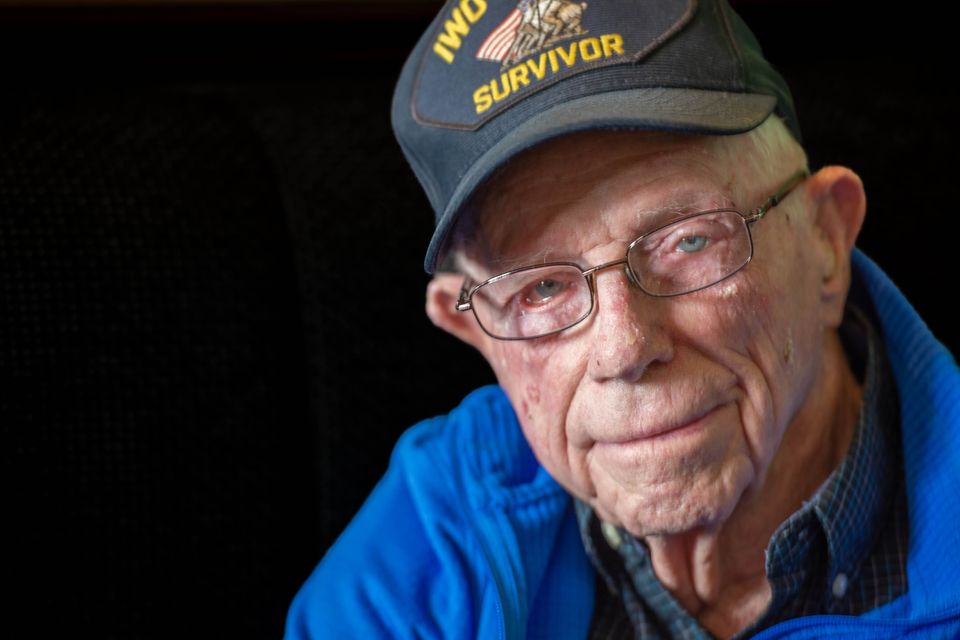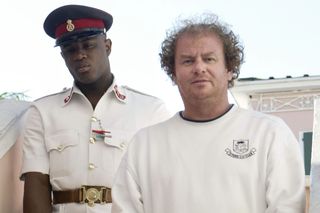Dream comes true for US World War II veteran as he celebrates 98th birthday in Cork pub singing ‘Danny Boy’
Retired US Marine Corps corporal Don Graves
A US Marine Corps veteran who survived the battle of Iwo Jima during World War II had his 98th birthday wish come true by visiting Ireland, having a pint in a pub and singing Danny Boy.
Don Graves, who retired as a corporal in the Marine Corps, had his dream come true thanks to the incredible outpouring of support when his story was aired in the US as part of the hit Last Letters podcast series by host Jeremy Lock and producer Scott Rettberg.
Over one million people listened to Don's story on the podcast – and the veteran was overwhelmed by the support he received, with hundreds of people donating so his Irish dream could be fulfilled.
Jeremy and Scott decided to help make Don's dream of an Irish visit a reality and worked to put together a group to accompany him.
The veteran visited Kinsale in Cork yesterday – and was deeply moved by the reception he received.
“It is just incredible – dreams really do come true,” said Don. "My grandmother was Irish, Susan Doherty from Cork, and I always wanted to visit."
The veteran was given a military tour of Cork by author Colonel (Rtd) Dan Harvey and history consultant Michelle O'Mahony.
Don, a native of Detroit who now lives in Texas, said he had wanted to visit Ireland for over 80 years.
The widower – who was married for 72 years – served as a church pastor in five different US states until his final retirement 16 years ago.
“I have always wanted to go to Ireland, sit in an Irish pub, order a beer, and I want to sing Danny Boy. That was my dream," he said.
Don loved singing throughout his life and was often invited to sing The Star Spangled Banner at numerous sports and veteran events in the US.
Aged 17, Don volunteered to serve in the Marine Corps during World War II with two friends.
He was stationed in the Pacific Theatre and found himself in the thick of the savage fighting at Iwo Jima island in the closing stages of the conflict.
A flamethrower operator – one of the most dangerous jobs in the Marines – Don was part of the amphibious assault in which the US attempted to take the island from Japanese forces and move closer to the Japanese home islands to the north.
“I didn't volunteer to be a flamethrower operator. My skipper put the pack on my back and that was that. I said to him later about how dangerous it was and he said: ‘You're still here, aren't you?’ – I was the smallest guy in my unit.”
Don is now one of just two members of his unit still alive.
Such was the incredible reaction to his story that he has also been invited to visit Normandy to attend ceremonies at the D-Day beaches.
“The support and kindness of people has been overwhelming,” he said.
The Battle of Iwo Jima began with a massive amphibious assault by marines on February 19 1945, following months of aerial and naval bombardment.
Over 70,000 marines took part in the 36-day battle, with more than 6,800 killed and 19,000 wounded.
Over 22,000 Japanese soldiers and sailors died, many of whom refused to surrender.
A total of 216 Japanese soldiers and sailors were captured alive, many only because they had been disabled by injuries or knocked unconscious.
The fighting was among the most brutal in World War II. Uniquely among Pacific War battles, the total number of American casualties exceeded those of the Japanese because the island defenders used a complex network of tunnels and bunkers.
US photographer Joe Rosenthal of the Associated Press helped ensure the battle's iconic status with his photograph of the US flag being raised on top of Mt Suribachi.
It remains one of the most famous images of World War II – and inspired the US Marine Corps statue that now stands at the approach to Arlington National Cemetery outside Washington.
Don witnessed the flag being raised, and said the spectacle of over 500 Allied ships firing rockets and guns and sounding horns to celebrate the event was something he will never forget.
He also revealed the Marines had to use an old Japanese water pipe to fly the flag as all timber on the island had been shattered in the fighting.
Three of the six Marines caught in the photo raising the flag in the photograph – Sergeant Michael Strank, Corporal Harlon Block, and Private First Class Franklin Sousley – were killed in battle within days.
The other three Marines in the famous photograph were Privates/Corporals Ira Hayes, Harold Schultz and Harold Keller.
Hayes, who was an Akimel O'Odham Native American from Arizona, later died of exposure and alcohol poisoning in 1955.
His tragic story inspired the song later made famous by Johnny Cash, The Ballad of Ira Hayes.
Cpl. Don Graves was a member of Company D (Dog Company), Second Battalion, 28th Marines, Fifth Marine Division.
Dog Company began the battle of Iwo Jima with 335 Marines and ended up with just 18 – and no surviving officers.
The intensity of the fighting and the massive casualties at first Iwo Jima and later Okinawa were instrumental in persuading President Harry Truman to use atomic weapons to force a Japanese surrender.
Don and a Virginia-based comrade are now the only two survivors of their entire unit.
“We used to have get-togethers and reunions. But we don't have them anymore. I'm the only one left,” he said.




